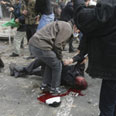
The United Nations General Assembly's human rights committee expressed "deep concern" Thursday about Iran's use of flogging, stoning and amputations as punishment in an annual review of the rights situation in several countries worldwide.
The committee voted 80-44 with 57 abstentions to underscore its worries about continued rights violations in Iran. It was a more resounding vote than last year, when the committee voted 74-48 on a similar resolution, with 59 members abstaining.
The measure is expected to be later approved by the full 192-member body.
The resolution noted continued "torture and cruel, inhuman or degrading treatment or punishment" in the Islamic-led country, as well as "the continuing high incidence and dramatic increase in the carrying out of the death penalty in the absence of internationally recognized safeguards, including public executions."
At the start of the meeting, Iran unsuccessfully tried to block the resolution by calling for a vote to take no action. That motion failed 51-91 with 32 abstentions.
In 2008, the last time Iran called for a no-action motion on a human rights committee resolution against it, the vote was much closer, 71-81, with 28 abstentions.
Mohammad Javad Larijani, secretary general of Iran's high council of human rights, told the committee that the "shameful" resolution was filled with "fallacies" and "unverifiable accusations." Although Canada was the leading sponsor, said Larijani, "the United States of America is the mastermind and the main provocateur" in the drafting of the resolution "to serve as part of US policy against the Islamic Republic of Iran."
'Religious fascism ruling Iran'
Maryam Rajavi, president-elect of the leading opposition group National Council of Resistance of Iran, said the "insufficient" resolution addressed "only a small part of the mullahs' egregious crimes against the people of Iran."
In a statement issued from her headquarters outside Paris, Rajavi nevertheless called the vote "an indication of a global consensus against the religious fascism ruling Iran." She called on countries to suppress trade and relations with Iran until its human rights situation improves.
The resolution noted "pervasive inequality and violence" against women in the Islamic country, including a crackdown on women human rights defenders.
For Iranians in general, it said, there were "systemic and serious restrictions" on free assembly, association and expression for political opponents, human rights defenders, lawyers, journalists, Internet providers and users and others. Political opponents continued to be harassed, intimidated and persecuted, it said.
The committee expressed "particular concern" at the government's failure to conduct a comprehensive investigation into alleged rights violations after the June 12, 2009 presidential elections. It called for an end to impunity for those who attacked demonstrators after the vote, and called on the government to no longer use its security forces and pro-government militias to break up peaceful protests.
Larijani defended his country's handling of the protests, and noted that the United States and France in the past have grappled with street protests of their own. Referring to Iran as an "Islamic democracy," he asked, "is it possible to have a democracy without protests?"
He also said Iran had already done a thorough investigation of events surrounding last year's election, and found "the government of the United States of America were deeply, extensively involved in substantially funding, training and leading .... and encouraging protesters."
The resolution on Iran's rights situation additionally described ongoing discrimination against ethnic minorities, including Arabs, Kurds, Christians and Jews, and persecution against members of religious minorities, especially the Baha'i faith.
The resolution said there was "increasing evidence of efforts by the state to identify, monitor and arbitrarily detain Baha'is," and to prevent them from attending university and holding jobs. It said their property had been confiscated and destroyed, and their cemeteries had been vandalized.
The resolution, the 23rd such condemnation of Iran since 1985, "leaves no doubt that the world remains deeply concerned with Iran's continued human rights violations," said Bani Dugal, representative of the Baha'i International Community.
- Follow Ynetnews on Facebook















